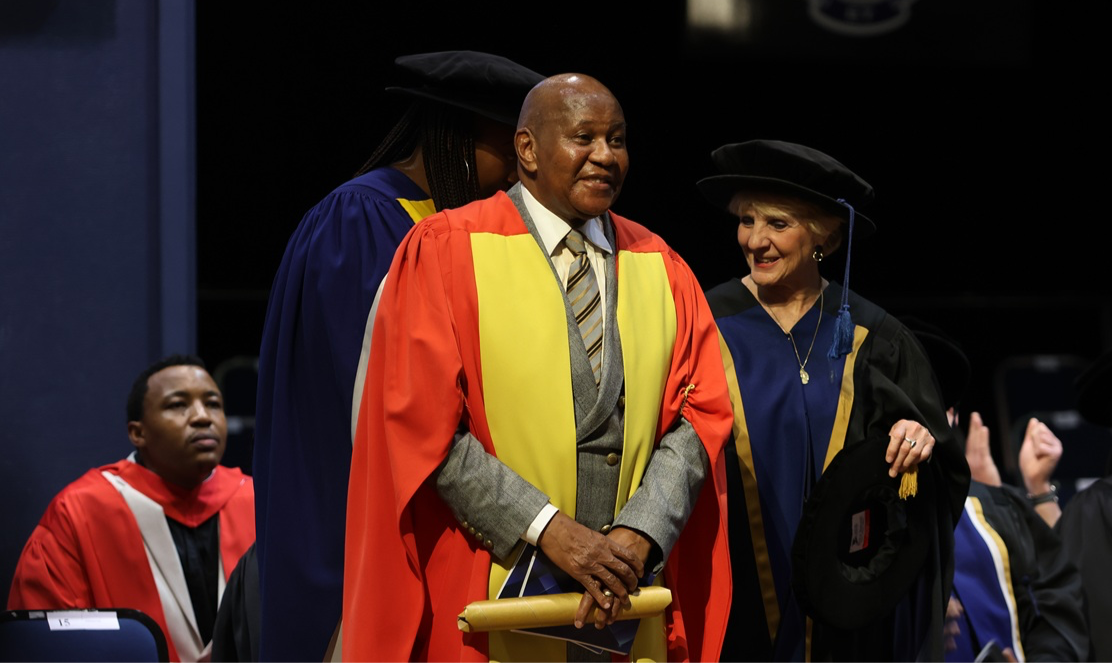Dr Kaizer Motaung reflects on Chiefs’ “crazy idea” beginnings after Wits honour

Dr Kaizer Motaung. Photo credit: Kaizer Chiefs
Dr Kaizer Motaung reflects on Chiefs’ “crazy idea” beginnings after Wits honour
Kaizer Motaung, known for his quiet demeanour but impactful actions, recently took centre stage when Wits University bestowed upon him an honorary Doctor of Commerce degree at their Great Hall.
On Tuesday, the Kaizer Chiefs boss, uncharacteristically, spoke at length, captivating the media and audience with the story of how he founded the iconic Chiefs brand 55 years ago.
This marks the second honorary doctorate for the 80-year-old Motaung. His first was a Doctor of Social Science Honoris Causa, awarded by the University of Cape Town in July 2022, in recognition of his significant contributions to football and social development in South Africa.
The latest honour from Wits University’s Faculty of Commerce, Law and Management acknowledges his substantial impact on the country’s business landscape over many decades.
Adding to his long list of accolades, Motaung was also inducted into the South African Hall of Fame in November 2023 for his “enduring commitment and positive influence on countless lives through sports and community engagement.”
Kaizer Chiefs Chairman, Dr. Kaizer Motaung, has been conferred a second honorary doctorate—this time by @WitsUniversity‘s Faculty of Commerce, Law & Management
A fitting tribute to decades of visionary leadership in SA business and sport
Congratulations Chairman!#WitsForGood pic.twitter.com/2ndmTV5Iyg
— Kaizer Chiefs (@KaizerChiefs) July 16, 2025
Beaming with pride alongside Wits Vice-Chancellor Professor Zeblon Vilakazi, Motaung expressed his joy at the latest recognition from an institution he holds in high regard. “This was a special day for me and obviously Kaizer Chiefs as well,” he shared. “This has been a very interesting journey we undertook in 1970.”
Motaung emphasised the personal significance of the honour, noting that several family members, including his children and grandchildren, are Wits alumni. “I’m happy I was able to accept this honour. It’s a great honour that has been bestowed upon me by the university. It’s an honour I think will be celebrated in my family,” he said.
Reflecting on his journey, Motaung asserted his broader impact beyond his playing days. “I’m no longer the ‘Chincha Guluva’ [his nickname] people used to know as a player, but I think I contributed also besides the issue of football on the field of play. I can safely say Kaizer Chiefs determines the happiness index of this country.”
He cited the recent Nedbank Cup victory, which ended a 10-year trophy drought for the club, as evidence of their profound influence. “A few weeks ago, we won a cup after 10 years or so. The country was in a very different mood. I’ve never seen the county like that — it was like there was a World Cup that was played here and yet it was just a local competition, the Nedbank Cup,” Motaung recalled.
“That demonstrated the power our supporters have. When we watched television, we saw universities, hostels, and townships; everywhere, people were celebrating. This just tells you how much we touch the hearts of the people in this country.”
He concluded, “I’m very happy and proud to have made a contribution to make a lot of people happy. I thank Wits University for the honour, and I think that’s all that there’s to it.”
Reflecting on the formidable journey of building Chiefs from scratch, overcoming countless obstacles with sheer determination, and steering the club to the pinnacle of the game, Motaung shared: “One of the most significant challenges I faced was starting Kaizer Chiefs FC and building it into the powerhouse it is today.”
He continued, “When we founded Kaizer Chiefs in 1970, many thought it was a crazy idea. We had limited resources, no established fan base, and a lot of scepticism about our chances of success. But I believed in the potential of the club, and I was determined to make it happen.”
“There were many obstacles along the way,” he concluded. “We faced financial struggles, logistical challenges, and intense competition from established teams. But I never gave up. I worked tirelessly to build a strong club, attracted talented players, and developed a winning culture and subsequently became known as the winners.”